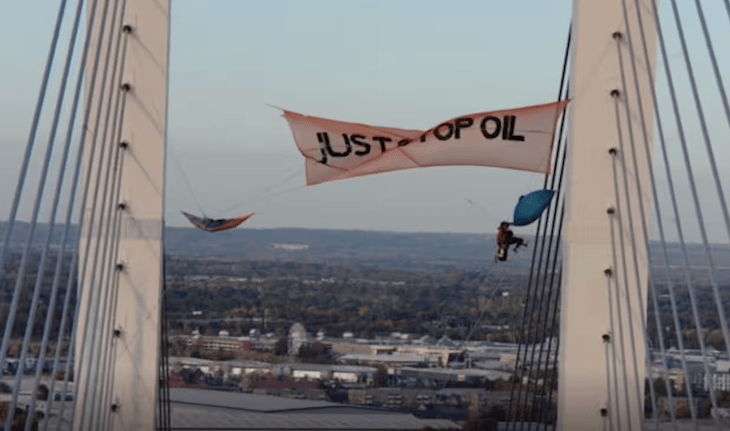We shouldn’t be surprised that Ian Fry, the United Nations’ rapporteur for climate change and human rights, has waded in on the jail terms handed to Just Stop Oil (JSO) activists. The UN has a growing habit of muscling in and trying to micromanage states’ internal affairs, especially in cases where there’s a progressive point to be made.
Fry said he was ‘particularly concerned’ about the sentences received by the two activists who scaled the M25 bridge over the Thames at Dartford last year. Marcus Decker and Morgan Trowland were convicted of causing a public nuisance, with Decker imprisoned for two years and seven months and Trowland for three years. Fry said the punishments were ‘significantly more severe than previous sentences imposed for this type of offending in the past’. That may be the case, but is it really his place to say so? Motorists left stuck in their cars for hours might well think differently. The pair were up there for 40 hours, having climbed on the bridge’s towers. They refused to come down until forcibly evicted by police in a cherry-picker. Judge Collery KC, who handed down the sentence, spoke for many when he told the two men ‘(you) plainly believed you knew better than everyone else’, adding: ‘In short, to hell with everyone else.’
But JSO, unsurprisingly, saw things differently. It sponsored a letter to Fry at the UN, asking him to intervene because the protesters were political prisoners and victims of repression. They could not have been more delighted with the response. In August, Fry wrote officially to our man at the UN. He said that climate change was ‘the largest, most pervasive threat to the natural environment and human societies the world has ever experienced’, and questioned what had happened to these ‘environmental human rights defenders’. He demanded that ‘all necessary interim measures’ be taken to prevent anything like this ever happening again, and for the ‘accountability of any person(s) responsible.’
The UN is becoming increasingly foolish, selective and, frankly, irrelevant when it comes to matters such as free speech
Much to the annoyance of JSO and the progressive establishment, the government has not responded. One can hardly blame it.
For one thing, it’s a bit difficult to see the connection between the freedoms of expression and assembly mentioned in Fry’s letter and the deliberate act of inconveniencing as many people as possible by blocking one of the country’s busiest roads for nearly two days. The reason we value free speech and assembly is precisely that they are non-invasive: they seek to persuade, not to coerce. If the Covenant on Civil and Political Rights is now to be interpreted as requiring democratic governments to allow aggressive pressure groups to impose their views by force on the public whether their electors agree or not (which is doubtful), one can hardly blame the UK government for not being over-keen on obeying it to the letter. The government has every right to see this as an impertinent attempt by an international apparatchik to intervene in the detailed internal administration of this country of a kind that needs to be resisted hard.
For another, there now seems a more than fair inference that the UN’s version of free speech is a remarkably partial one, certainly a long way from the idea that it should be content-neutral, benefiting maverick as much as fashionable views. Imagine that the M25 protesters had been not JSO but, say Fathers4Justice, calling for an increase in fathers’ rights as regards children, or a ginger group calling for effective measures to reduce irregular UK immigration. The issue should be exactly the same: but would the UN special rapporteur on freedom of opinion and expression (a post which very much exists) have intervened in the same way that Fry did here? Anything, I suppose, is possible with the UN: but don’t hold your breath.
Does it matter that the UN seems to be becoming increasingly foolish, selective and, frankly, irrelevant when it comes to matters such as free speech? Actually it does. There are plenty of states guilty on a regular basis of serious and violent suppression of dissent, including those guilty of nothing more than ordinary, non-coercive speech or membership of non-violent campaigning organisations. The UN retains the ability to do a great deal of good for freedom and world peace in such cases.
If so, however, it needs seriously to avoid frittering away what respect it still retains by intervening in the case of vociferous but undeserving organisations like JSO. The members of the Human Rights Council who control the appointment and activities of their special rapporteurs have the power discreetly to rein them in. They would do well to recall this. On the question whether the UN can remain as a credible organisation in the field of civil rights, the choice is, one suspects, largely theirs.






Comments